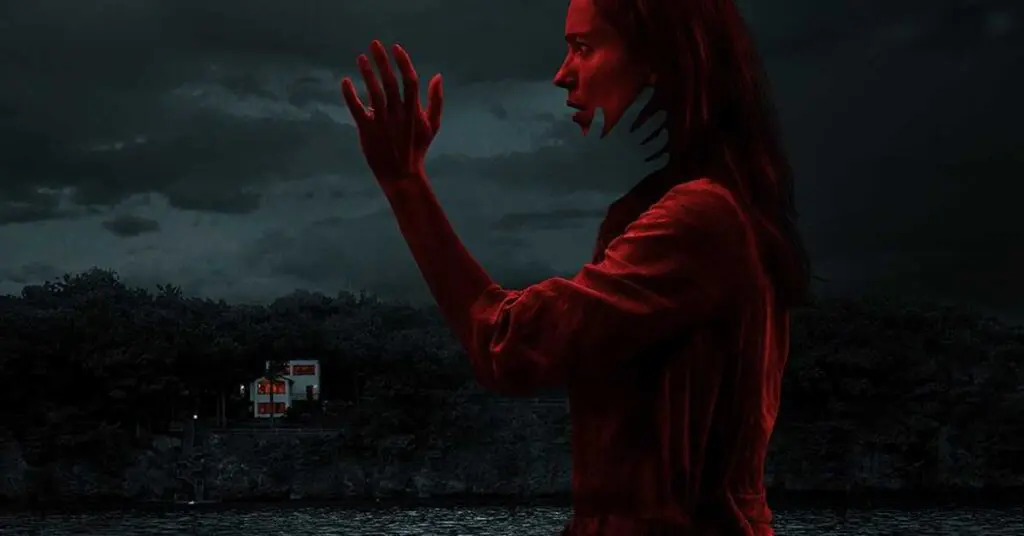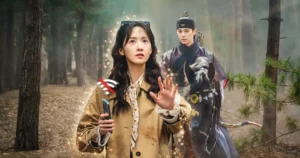Summary
After the suicide of her husband, Beth is left picking up the pieces in the lake house her late husband built, but dreams, visions, and secrets revealed lead her into a nightmarish world where nothing is as it seems.
Directed by David Bruckner (Hellraiser), from a screenplay by Ben Collins and Luke Piotrowski, this slow-burning ghost story stars Rebecca Hall (as seen in Holmes & Watson, Passing, Resurrection) as a haunted widow desperate to get to the hidden secrets left behind by her husband.
The first act serves up the premise and has some creepy moments, with Beth receiving text messages from her dead husband, and having visions in the house he built for her, but it is made clear early on that Beth likes a drink, so when the scene jump cuts to the morning, we are left unsure as to what was real and what she dreamed.
It’s a technique that The Night House will go on to to use, but as well as creating a mystery, it also serves to alienate the audience a little too.
As if to add to the frustration of the viewer, Rebecca Hall does very little to help us empathize with her plight. She is seen very early on in a confrontation with the mother of a pupil who is disagreeing with her son’s grade on a test.
The mother knows nothing of Beth’s tragic loss, but Beth seems to almost take some kind of pleasure when she gets to put the mother in her place by flippantly explaining the details of her husband’s suicide.
It’s an awkward scene, and I am not sure what the point was. Are we meant to feel sorry for Beth? If so, it fails miserably as her brash manner and unsympathetic tone leave us feeling as downtrodden as the mother of the school kid.
Hall continues to infuse her character with little more than angry sarcastic tendencies, making her workmates and friends uncomfortable in every social occasion, and in return, we as viewers start to also lose sympathy with her.
It’s a terrible mistake in the production, as there is very little here that makes us root for Beth. In other hands, we may have been more on board with the situation, making the conclusion much more impactful, but by the end of the third act, I was rooting for the ghosts.
As the story continues, Beth finds pictures on her husband’s phone, a phone he foolishly has not password-protected, and starts to uncover some disturbing truths in the events leading up to his suicide.
The ghostly supernatural sequences continue, but the director lets himself down by relying on the music to provide us with jump scares. There was an opportunity here to actually present a slow-burning, almost gothic ghost story that could have slowly built up the tension and dread before the finale, but instead, The Night House falls back on the usual tropes you would expect to see.
Perhaps there was a draft where the atmosphere was allowed to build towards a finale, but instead, we get the usual Blumhouse-esque tropes that drag this particular film into cliché.
As we get to the meat of the story, things start to fall apart. The actual premise, that I won’t spoil here, gets sillier and sillier, and the denouement makes little sense. The motivations of the ghost, and the manipulation it invokes to get its own way, are just nonsensical, and the script, that seeds ideas throughout, never really pays anything off.
Perhaps on subsequent viewings, some of the more subtle nuances of the story become more apparent, but I can’t really see myself sitting through this again.
If a ghost story wants to be slow-burning, then it has to stick to its guns and see it through, without peppering scenes with loud bangs. The horror should come from the atmosphere and dread we feel for the characters, but The Night House never makes us really feel sorry for anyone, leading to a final scene that is neither exciting, revealing, or conclusive.
If you enjoy ghost stories, then you can check this out, but there’s a chance you may have seen this done before, but with better jump scares.
Read More:




